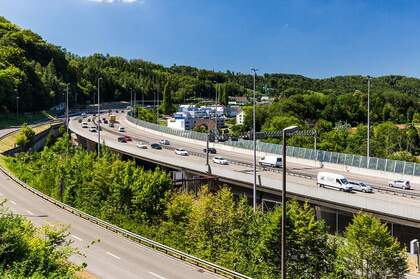In Switzerland, you are taxed on the type of vehicle you drive, in order to help maintain the road and system of motorways. Once you have registered a car in Switzerland, or have imported a vehicle, your local traffic office will begin to charge you vehicle tax, annually in January, or in the month you registered the vehicle. Different counties (cantons) calculate road tax differently, with some basing the tax on the size of your vehicle, while others calculate it based on the vehicle’s horsepower and carbon emissions.
Who must pay Swiss vehicle tax?
Everyone who owns a vehicle in Switzerland has to pay vehicle tax. The tax is given to the government, who use the funds to support the maintenance of roads and motorways. The tax, which applies to all motor vehicles, is charged as a lump sum when you first register your car and each subsequent year. Electric and hybrid cars are not entirely exempt from vehicle tax.
How is vehicle tax calculated in Switzerland?
The way that vehicle tax is calculated depends on the canton where you have registered the vehicle. The factors taken into consideration range from horsepower output to weight and cubic size. Below are the criteria that the different counties use, with each county that uses said system listed.
Cubic capacity of the vehicle and horsepower
The majority of cantons use a combination of cubic capacity and horsepower in order to calculate road tax. Cubic capacity is defined as the cubic centimetres that the vehicle takes up. The tax is also increased by the amount of horsepower the vehicle has. This system is used to tax vehicles which are larger and more powerful, which consequently means they expel more carbon emissions.
- Cantons that use this system: Aargau, Fribourg, Glarus, Graubünden, Lucerne, Nidwalden, Obwalden, Schaffhausen, Solothurn, Thurgau, Valais, Zug
Vehicle weight
Some cantons use the weight of a vehicle in order to calculate the rate of tax. These taxes are based on the weight of the vehicle between the four or two axles, meaning the larger the vehicle, the more tax you pay.
- Cantons that use this system: Appenzell Innerroden, Appenzell Ausserrhoden, Bern, Basel Land, Jura, St. Gallen, Uri
Horsepower
Many cantons use the total horsepower of the vehicle to calculate the level of tax. This is based on the idea that the higher the horsepower of the car, the more valuable the car is. It is also used to dissuade people from buying cars that emit a large amount of carbon dioxide.
- Cantons that use this system: Geneva
Carbon dioxide emissions
Increasingly, more cantons are starting to use carbon emissions to calculate car tax. In this model, cars are taxed according to the amount of carbon emissions they expel. While few cantons use this as the basis for the tax, many counties reward low emission vehicles with tax exemptions.
- Canton that uses this system: Neuchatel
Vehicle tax in other Swiss cantons
Many counties use a hybrid system of taxation, combining some or all of these methods to calculate the amount of tax they charge. These are:
- Canton Schwyz, Ticino and Vaud use horsepower and weight
- Canton Zurich uses cubic capacity and weight
- Canton Basel Stadt uses weight and carbon dioxide emissions
Vehicle taxes in Switzerland for hybrid and electric vehicles
If you have purchased a hybrid or electric vehicle, you may be allowed to apply for tax credits or some form of tax relief. Many cantons offer incentives to buy electric and hybrid cars which influences the taxation system in Switzerland.
Some of the more urban cantons, such as Zurich, Bern and Basel, offer discounts on your tax bill if you own an electric or hybrid vehicle. Bear in mind that these benefits are limited to the canton where you have registered your vehicle, with over half of counties not offering any discounts. Please check with your local traffic office for more information.
Paying your vehicle tax bill in Switzerland
You start paying taxes on your new car from the moment you register it in Switzerland. When you are due to pay your vehicle tax for the first time, your local traffic office will contact you and will request the following:
- Your confirmed and completed vehicle registration form
- The type of vehicle as shown as a serial number on your registration form
- The cubic capacity of your car
- The weight of your car
- The amount of CO2 emissions your car produces
- The date when the vehicle was first registered
Depending on the canton, this information can either be found on your registration form or by contacting your dealer or car insurance provider. Once this application form is completed, your local traffic office will use this to calculate all taxes on the vehicle in the future.
How much is Swiss vehicle tax?
Swiss vehicle tax is set by individual counties. The rate is decided upon depending on the county's needs when it comes to funding domestic road systems. Typically, the rate is around 200 to 1.000 Swiss francs a year for a car and 100 to 800 for a motorbike.











